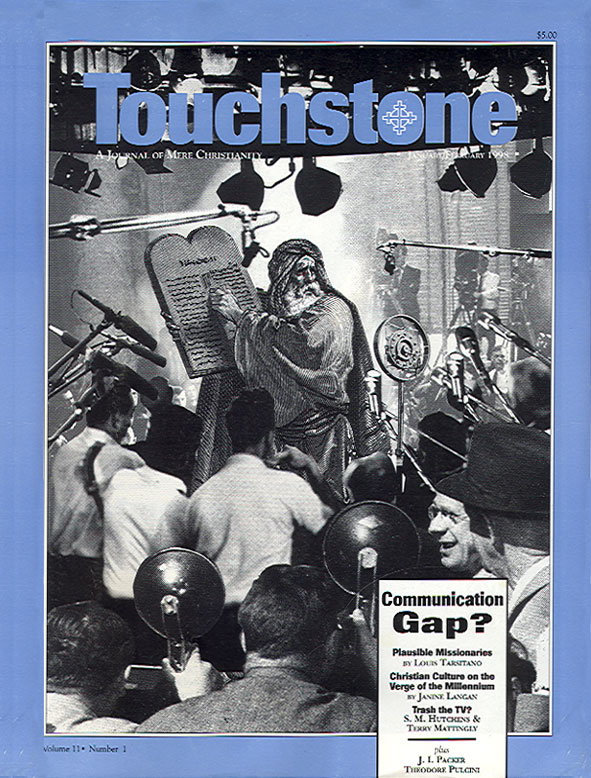Positively Not
A friend, commenting on one of Anglicanism’s most notorious heretics, said that he remembered when he was “a sane and orthodox man.” I replied that the man in question—his name does not matter here, but we were not speaking of the Bishop of Newark—was never orthodox in the sense, which I am beginning to think is the best and truest test, of being willing to say the “no” that is a consequence of the “yes.”
I remember attending his parish one Sunday many years ago. The Epistle lesson was one of St. Paul’s passages in which he lists and condemns a variety of sins. The list included sodomy, and this priest managed to preach for about twenty minutes and mention every sin in the passage but that one, yet it was the one sin in the list of which many in his parish needed to hear, for their souls’ (and bodies’) sake. The other sins he discussed, with some insight, had been committed by everyone there, and therefore their inclusion in the sermon was not offensive to any.
It is odd that so many Christians so deeply fear saying a simple no. That no follows yes, and is the condition of the yes coming true, is a fundamental Christian principle. The First Commandment begins “I am the Lord thy God that brought thee out of the land of Egypt, out of the house of bondage” (yes) and concludes “Thou shalt have none other gods but me” (no). If God is God, all other claimants to the title aren’t; if you want to follow the one you cannot follow the other. Saying yes to the living God means saying no to idols.
Thus “affirming” or “positive” orthodoxy lacks the completion and balance and accuracy of orthodoxy. It does not describe what is really there. The “affirming” Christian leaves the idols standing in their groves even while inviting people to the temple, and then does not notice that so many people are still making sacrifice to Baal.
The Bible is not, in this sense, a positive book. Even the comparatively placid Apostle John used “inflammatory language” when an error had to be, to use Internet jargon, flamed. These willfully positive and affirming Christians would have patronized St. Paul, who was often so negative. They would have been pained by that unbalanced extremist Elijah, and disappointed that his successor Elisha proved little more tolerant and irenic. One is not certain how they would have felt about Jesus, though they would not have been surprised when he got himself killed.
The danger of this incomplete and unbalanced orthodoxy is that, human nature being what it is, and the nature of ambitious humans being even worse, a Christian unwilling to say no eventually says yes to the things to which he would, had he spoken, have once said no.
This “positive” approach is the one taken by many self-consciously biblical Christians—especially (as I have mentioned in these pages before) those who have accepted, indeed have consciously compromised on, the ordination of women and relaxed marital discipline. By refusing to say no to the interchangability of the sexes, they have failed to say yes to the sacrificial headship of men. By fearing to say no to multiple marriages, they have failed to say yes to the transforming power of a life-long covenant.
Many of these very sincere Christians will follow the same path in their views of homosexuality. They will move from refusing to say no to saying “perhaps” or “for some people” or “in certain circumstances,” and then begin to say, first quietly but then more and more publicly, “yes.” And, the habit of compromise established, they will then do the same with “inclusive” prayers and liturgies, abortion, and the replacement of evangelism with universalism and interreligious dialogue.
And so the willingness to say no when needed, which means whenever the no is in danger of being forgotten, is a better test of orthodoxy than the affirmation of central truths by itself. He who says yes to God must publicly say no to what stands against God. A yes without the corresponding no is incomplete, unbalanced, inaccurate and thus has not the power to challenge and transform. Always to say no when no must be said is also a wise personal rule, for preventing oneself from sliding away from those central truths—for “growing” into accepting what one at one time thought abhorrent.
A public no may divide us from other Christians who dislike saying no or dislike the no we have said, but it may unite us with the Lord. We must say no to many things, because we have said yes to him—and should we stop saying no, we might, indeed probably will, soon stop saying yes, or say it so quietly that no one will hear.
—David Mills, for the Editors
David Mills has been editor of Touchstone and executive editor of First Things. He edits the opinion page of the Pittsburgh Post-Gazette.
subscription options
Order
Print/Online Subscription

Get six issues (one year) of Touchstone PLUS full online access including pdf downloads for only $39.95. That's only $3.34 per month!
Order
Online Only
Subscription

Get a one-year full-access subscription to the Touchstone online archives for only $19.95. That's only $1.66 per month!
bulk subscriptions
Order Touchstone subscriptions in bulk and save $10 per sub! Each subscription includes 6 issues of Touchstone plus full online access to touchstonemag.com—including archives, videos, and pdf downloads of recent issues for only $29.95 each! Great for churches or study groups.
Transactions will be processed on a secure server.
more from the online archives
calling all readers
Please Donate
"There are magazines worth reading but few worth saving . . . Touchstone is just such a magazine."
—Alice von Hildebrand
"Here we do not concede one square millimeter of territory to falsehood, folly, contemporary sentimentality, or fashion. We speak the truth, and let God be our judge. . . . Touchstone is the one committedly Christian conservative journal."
—Anthony Esolen, Touchstone senior editor









